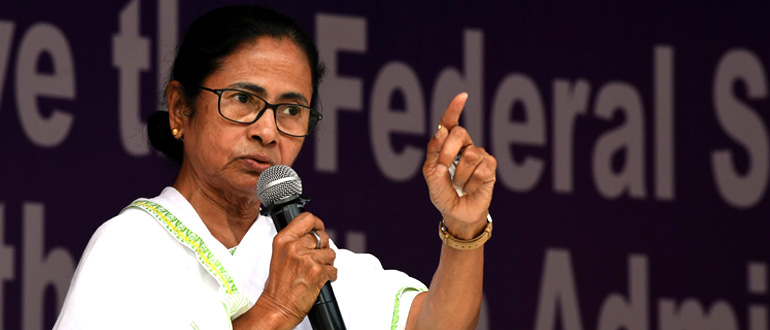New Delhi:TMC chief and West Bengal CM Mamata Banerjee on Wednesday said that she was willing to stay in Kashmir to find a solution so that there can be peace in the state of Jammu and Kashmir.
Mamata Banerjee was speaking after the release of the TMC manifesto for Lok Sabha elections 2019.
The TMC will work for the revival of the Planning Commission, institution of a judicial inquiry into demonetization and a review of the GST if the opposition alliance is voted to power in the Lok Sabha polls, its manifesto released by Mamata Banerjee said on Wednesday.
Banerjee, a prime mover behind the efforts to cobble together an anti-BJP alliance of opposition parties, said she is not fighting for “chair” and that her aim is to rid the country of the “reign of fear”.
The West Bengal chief minister also said the 100-day work provision under MNREGA, the government’s flagship employment scheme for the rural poor, will be extended to 200 days a year and the wages doubled.
“Why was demonetisation carried out? We want a judicial probe monitored by a former Supreme Court judge…We will bring back the Planning Commission and ensure that it strengthens the federal structure,” she told a press conference after releasing the manifesto.
The 67-page manifesto has been published in Bengali, English, Hindi, Nepali, and Ol Chiki, the tribal Santhali language.
“We want the GST to be reviewed by an expert committee. If it is really helping people, we would keep it or else we would review it,” she said, but went on to add that both GST and demonetization have “destroyed” Indian economy.
Targeting the Modi government over its alleged failure to keep its promise of creating two crore jobs every year, Banerjee said the new government will lay special stress on employment generation and filling up the vacancies meant for Schedule Caste, Scheduled Tribe and Other Backward Classes candidates, including those from the minorities.
Banerjee said women’s empowerment and bringing workers in unorganised sectors under social security cover will be priority areas for the new dispensation.
When asked about the foreign and defence policy direction of the future government she wants to form at the Centre, Banerjee said these will be discussed after such a dispensation comes into being.
“As a political party we have always maintained that whatever decision the government takes in terms of foreign policy and defence we will support that. But when the new government comes to power we will discuss and decide on it,” she said.
In her reply to a query on the opposition alliance’s proposed common minimum programme, she said her party is working for building a united India and it will be chalked out in consultation with like-minded parties.
“We cannot impose our views on other parties. We are putting across our partys views today in the manifesto,” she said.
Banerjee disapproved of the appointment of former BSF chief K K Sharma as special police observer for West Bengal and Jharkhand for the Lok Sabha elections.
“How can a retired police officer look after the deployment of serving police personnel? During his tenure as the DG, he attended an RSS programme and that too in uniform,” she said, and asked “Is he an impartial observer? Is this a way to ensure we will get justice? Is this democracy?”



